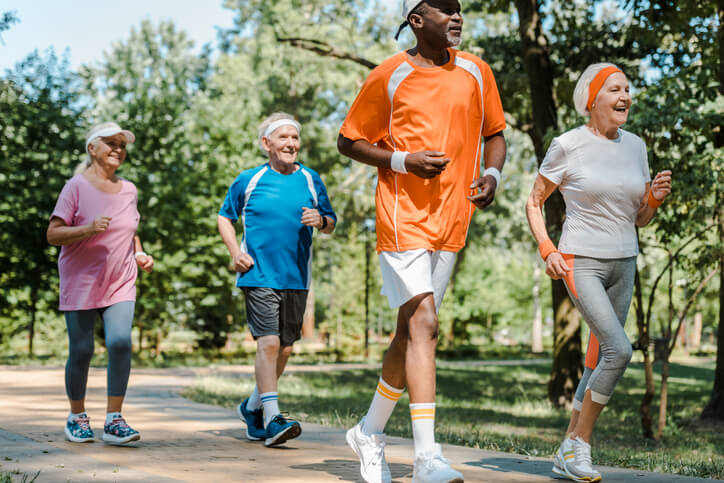Boost Energy Levels
Boost Energy Levels
As we age, it’s common for our energy levels to decline, leaving us feeling fatigued and less motivated. However, it doesn’t have to be this way. With a few lifestyle adjustments and simple strategies, seniors can enhance their energy levels and enjoy a more active and fulfilling life. In this article, we will explore five effective ways for seniors to boost their energy levels and maintain vitality as they age.
Prioritize Quality Sleep
Adequate and quality sleep is crucial for maintaining energy levels and overall well-being. As we grow older, our sleep patterns often change, making it important to prioritize restful sleep. Here are some tips to improve sleep quality:
a. Establish a Routine: Stick to a consistent sleep schedule by going to bed and waking up at the same time each day.
b. Create a Soothing Environment: Ensure your bedroom is dark, quiet, and at a comfortable temperature. Use earplugs, eye masks, or white noise machines to eliminate any disturbances.
c. Limit Stimulants: Avoid consuming caffeine, nicotine, and alcohol, especially close to bedtime, as they can interfere with sleep quality.
d. Practice Relaxation Techniques: Engage in activities such as reading, taking a warm bath, or practicing deep breathing exercises to relax your mind and body before bedtime.
e. Invest in a Comfortable Mattress: Consider investing in a supportive and comfortable mattress that meets your individual needs, helping promote better sleep quality.
By prioritizing sleep and adopting healthy sleep habits, seniors can enhance their energy levels and wake up feeling refreshed and rejuvenated.
Stay Physically Active
Regular physical activity is one of the most effective ways to boost energy levels and improve overall health. Engaging in exercise not only increases stamina but also releases endorphins, which elevate mood and combat fatigue. Here are some ways seniors can stay physically active:
a. Low-Impact Aerobic Exercises: Opt for exercises such as brisk walking, swimming, cycling, or water aerobics, which are gentle on the joints while still providing cardiovascular benefits.
b. Strength Training: Incorporate strength training exercises using resistance bands, light weights, or bodyweight exercises like squats and lunges. Strength training helps build muscle, improve bone density, and increase overall strength and vitality.
c. Flexibility and Balance Exercises: Engage in activities like yoga, tai chi, or Pilates, which improve flexibility, balance, and coordination, reducing the risk of falls and injuries.
d. Daily Movement: Encourage regular physical activity by incorporating simple habits like taking short walks after meals, using the stairs instead of elevators, and participating in household chores or gardening.
Remember to consult with a healthcare professional before starting any new exercise regimen to ensure it is suitable for your individual needs and health condition.
Maintain a Nutrient-Rich Diet
A well-balanced diet plays a crucial role in sustaining energy levels and promoting optimal health. Seniors should focus on consuming nutrient-dense foods that provide essential vitamins, minerals, and antioxidants. Consider the following dietary guidelines:
a. Eat a Rainbow of Fruits and Vegetables: Include a variety of colorful fruits and vegetables in your meals to obtain a wide range of vitamins, minerals, and antioxidants. Aim for at least five servings per day.
b. Opt for Whole Grains: Choose whole grain options such as whole wheat bread, brown rice, and oats over refined carbohydrates. Whole grains provide sustained energy and fiber, aiding in digestion.
c. Incorporate Lean Proteins: Include lean sources of protein such as fish, poultry, beans, lentils, and tofu in your meals. Protein helps repair and build tissues and supports muscle strength.
d. Hydrate Properly: Drink an adequate amount of water throughout the day to prevent dehydration, which can lead to fatigue. Limit sugary drinks and opt for water, herbal teas, or infused water for hydration.
e. Consider Nutritional Supplements: Consult with a healthcare professional to determine if you require any additional supplements, such as vitamin D or B12, to address any specific deficiencies. Check out these top-rate Athletic Greens
Manage Stress Levels
Chronic stress can significantly impact energy levels and overall well-being. Seniors should prioritize stress management techniques to maintain a healthy and balanced lifestyle. Here are some strategies to manage stress effectively:
a. Practice Relaxation Techniques: Engage in activities such as meditation, deep breathing exercises, or gentle stretching to promote relaxation and reduce stress.
b. Engage in Hobbies and Social Activities: Pursue activities you enjoy, such as reading, painting, gardening, or joining social groups, which provide mental stimulation and a sense of purpose.
c. Prioritize Self-Care: Dedicate time for self-care activities, such as taking a warm bath, listening to music, or enjoying a hobby. It is essential to prioritize your own well-being and engage in activities that bring you joy.
d. Seek Support: Maintain strong social connections and reach out to family, friends, or support groups when needed. Sharing your feelings and experiences can help alleviate stress and provide emotional support.
e. Practice Mindfulness: Stay present and focus on the present moment, avoiding excessive worry about the past or future. Mindfulness techniques can help reduce stress and increase overall well-being.
Get Regular Health Check-Ups
Regular health check-ups are essential for identifying and addressing any underlying health issues that may contribute to low energy levels. Seniors should visit their healthcare provider regularly to monitor their overall health and discuss any concerns. The check-ups may include:
a. Comprehensive Physical Examinations: Regular physical examinations can help identify any potential health concerns and ensure early detection of any issues.
b. Blood Tests: Blood tests can help assess various health markers such as cholesterol levels, blood sugar, and nutrient deficiencies, enabling timely interventions.
c. Medication Review: Discuss your current medications with your healthcare provider to ensure they are appropriate and not causing any side effects that may contribute to fatigue.
d. Vision and Hearing Examinations: Regular vision and hearing tests are crucial for maintaining optimal sensory function, which can indirectly impact energy levels.
Conclusion
Maintaining high energy levels is vital for seniors to enjoy an active and fulfilling life. By prioritizing quality sleep, staying physically active, adopting a nutrient-rich diet, managing stress levels, and getting regular health check-ups, seniors can boost their energy levels and improve their overall well-being. Embracing these lifestyle changes and seeking support from healthcare professionals will empower seniors to lead a vibrant and energized life in their golden years. Here are wonderful activity ideas for seniors.




